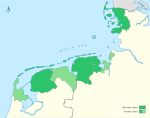
Back Nacionalismo frisón GL Nasionalisme Frisia ID Фризский национализм Russian Nacionalizmi frizian SQ

Frisian nationalism (West Frisian: Frysk nasjonalisme, Dutch: Fries nationalisme, German: friesischer Nationalismus) refers to the nationalism which views Frisians as a nation with a shared culture. Frisian nationalism seeks to achieve greater levels of autonomy for Frisian people, and also supports the cultural unity of all Frisians regardless of modern-day territorial borders. The Frisians derive their name from the Frisii, an ancient Germanic tribe which inhabited the northern coastal areas in what today is the northern Netherlands, although historical research has indicated a lack of direct ethnic continuity between the ancient Frisii and later medieval 'Frisians' from whom modern Frisians descend.[1] In the Middle Ages, these Frisians formed the Kingdom of Frisia and later the Frisian freedom confederation, before being subsumed by stronger foreign powers up to this day.
The lands inhabited by Frisians are today known as Frisia and they stretch throughout the Wadden Sea region from the northern Netherlands to north-western Germany. These areas have sometimes been collectively referred to with the Latin names Magna Frisia (Greater Frisia) and Tota Frisia (Whole Frisia).[2] Frisia is usually divided into three parts: West Frisia in the northern Netherlands, East Frisia in the German state of Lower Saxony, and North Frisia in the German state of Schleswig-Holstein. Frisia is also divided between different languages, with the only ones remaining today being West Frisian in the Netherlands, by far the most widespread, and the less-spoken Saterland Frisian in Lower Saxony and North Frisian in northwestern Schleswig-Holstein.

Since the end of the Renaissance, these lands have been ruled by foreign powers and Frisian culture has gradually been supplanted in many areas by those of their administrators, with Frisian nationalism arising as a conscious movement primarily in the 19th century.[3] In the 19th and 20th centuries, increasing contacts between Dutch and German Frisians spurred the formation of a transnational consciousness which was typified by conceptions of a shared history, an occasionally ambivalent or even absent relationship with the Frisian language (which had been supplanted by Dutch and German in many areas), an emphasis on peripheral rurality, and a view of Frisians as having a "loving, independent and level-headed" character.[2] However, despite the romantic mythical notions of early Frisian nationalists who often wrote of a Great Frisian Empire of the past and modern Frisia's historical continuity with it, modern-day historical research has indicated that Frisia has long had a complex sociopolitical landscape and that modern Frisia's relationship to its past contains some elements which are "discontinuous, ambivalent and even contrary."[2]
- ^ Bazelmans, Jos (2009). "The early-medieval use of ethnic names from classical antiquity: The case of the Frisians". In Derks, Ton; Roymans, Nico (eds.). Ethnic Constructs in Antiquity: The Role of Power and Tradition. Ton Derks, Nico Roymans. Amsterdam: Amsterdam Univ. Press. pp. 321–337. ISBN 978-90-485-0791-7. OCLC 391593170.
- ^ a b c Jensma, Goffe (2018). "Remystifying Frisia". In Egberts, Linde; Schroor, Meindert (eds.). Remystifying Frisia: The 'experience economy' along the Wadden Sea coast. History, Landscape and Cultural Heritage of the Wadden Sea Region. Amsterdam University Press. pp. 151–168. doi:10.2307/j.ctv7xbrmk.13. ISBN 978-94-6298-660-2. JSTOR j.ctv7xbrmk.13. S2CID 240224713.
{{cite book}}:|work=ignored (help) - ^ Boucher, Harrison (2017). "Ethnolinguistic Nationalism in Fryslân". Gustavus Adolphus College. Archived from the original on 2021-11-10. Retrieved 2021-11-10.